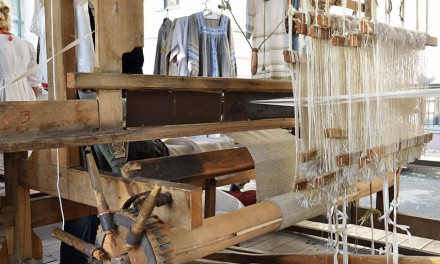If you're looking for new bedding or loungewear, you may have seen "GOTSⓇ certified" mentioned in some product descriptions. The label is used to identify organic textiles, namely cotton. But what does “GOTSⓇ certified” mean, exactly? Is it better than regular cotton, and if so, is it worth the investment?
What Is GOTSⓇ?
GOTSⓇ is the Global Organic Textile Standard — the world's leading certifier for textiles made with organic fibers. In addition to ensuring a product consists of organically grown or raised materials, the organization certifies that each stage of the textile processing adheres to social and ecological criteria.
Is GOTSⓇ Legit?
GOTSⓇ is considered the gold standard for organic materials and sustainable manufacturing. It provides consumers with trustworthy, easily identifiable information about fabrics while giving brands and retailers credibility by way of an independent third-party certification.
The Global Organic Textile Standard is a non-profit company. To ensure consistency and relevancy with its criteria, the organization has a designated Standards Committee, a Certifiers Council and regional representatives throughout the world.
For a deeper dive, see our article, What is Organic Cotton? Sustainable Cotton Fabric Guide.
What Is GOTSⓇ?
GOTSⓇ is the Global Organic Textile Standard — the world's leading certifier for textiles made with organic fibers. In addition to ensuring a product consists of organically grown or raised materials, the organization certifies that each stage of the textile processing adheres to social and ecological criteria.
Is GOTSⓇ Legit?
GOTSⓇ is considered the gold standard for organic materials and sustainable manufacturing. It provides consumers with trustworthy, easily identifiable information about fabrics while giving brands and retailers credibility by way of an independent third-party certification.
The Global Organic Textile Standard is a non-profit company. To ensure consistency and relevancy with its criteria, the organization has a designated Standards Committee, a Certifiers Council and regional representatives throughout the world.
For a deeper dive, see our article, What is Organic Cotton? Sustainable Cotton Fabric Guide.
How Does a Product Become GOTSⓇ Certified?
The first requirement is that the textiles must contain a certain amount of organic fibers. To carry the standard GOTSⓇ label, a garment or bedding item must be made of at least 70% certified organic fibers. If a product is label-grade organic, it must contain 95% or more organic fibers.
What Are Organic Fibers?
Organic fibers are the raw plant materials that are spun into yarns or woven directly into fabrics. Those with a GOTSⓇ certification adhere to the international standards of organic farming set by the IFOAM, meaning they're grown without GMOs (genetically modified organisms), herbicides or synthetic pesticides.
What Is the IFOAM?
The IFOAM is the International Federation of Organic Agriculture Movements, a global umbrella organization representing nearly 800 affiliates in over 100 countries, including GOTSⓇ. GOTSⓇ certified textiles are loomed from at least 70% organic fibers that meet the organization's standards.
How Does a Product Become GOTSⓇ Certified?
The first requirement is that the textiles must contain a certain amount of organic fibers. To carry the standard GOTSⓇ label, a garment or bedding item must be made of at least 70% certified organic fibers. If a product is label-grade organic, it must contain 95% or more organic fibers.
What Are Organic Fibers?
Organic fibers are the raw plant materials that are spun into yarns or woven directly into fabrics. Those with a GOTSⓇ certification adhere to the international standards of organic farming set by the IFOAM, meaning they're grown without GMOs (genetically modified organisms), herbicides or synthetic pesticides.
What Is the IFOAM?
The IFOAM is the International Federation of Organic Agriculture Movements, a global umbrella organization representing nearly 800 affiliates in over 100 countries, including GOTSⓇ. GOTSⓇ certified textiles are loomed from at least 70% organic fibers that meet the organization's standards.
What Stages of the Supply Chain Does GOTSⓇ Assess?
What Stages of the Supply Chain Does GOTSⓇ Assess?

In addition to confirming the cotton fibers were organically grown, six critical stages of the supply chain are carefully assessed before a product can carry the GOTSⓇ label.
This Includes:
First processing stages
Spinning
Weaving and knitting
Wet-processing
Manufacturing
Trading
See details about each stage below.
1. First Processing Stages
A GOTSⓇ certification starts with the initial processing of raw plant fibers. With cotton, the first step is ginning — as in, with a cotton gin — which involves removing the seeds from the fibrous cotton bolls. (Cotton bolls are the rounded puffs found on plants; cotton balls are what you can purchase at the drugstore.)
2. Spinning
Once the fibers are free of seeds, they're converted into yarns using an open-end spinning technique. In some cases, synthetic or inorganic fibers might be blended with the cotton, but as noted, the GOTSⓇ certified label calls for at least 70% organic material.
3. Weaving and Knitting
Next, the yarns are made into fabric using a weaving or knitting technique. GOTSⓇ allows for both hand-loomed and machine-woven textile fabrication, but with the latter, any machinery oils used must be free of heavy metals.
4. Wet-Processing
The next stage is wet-processing. This step can involve various treatments, such as dyeing, bleaching, washing, printing, bonding, chemical strengthening (aka sizing) and chemical removal (aka desizing).
5. Manufacturing
Manufacturing is the last step of the production process for GOTSⓇ certified textiles. This step varies among products and can involve anything from cutting, trimming and filling to stitching, labeling and packaging.
6. Trading
Trading is the final stage of the supply chain GOTSⓇ evaluates. Organizations that buy and sell materials cannot alter the labeling or the product itself before making it available to retailers or consumers.
Retailers and direct-to-consumer (DTC) brands carrying GOTSⓇ textiles aren't required to get the certification themselves. However, many apply for certification voluntarily to give their customers clear assurance about the quality and eco-friendliness of their products.
Is GOTSⓇ Only for Cotton?
The Global Organic Textile Standard was created for various natural fibers, including those derived from organically grown plants and organically raised animals. While cotton is the most common organic textile, GOTSⓇ certified products can also be made of linen, silk, cashmere, wool, shearling and down.
See our Fabric and Bedding Materials Guide to learn more about our sheets.
Is GOTSⓇ Only for Cotton?
The Global Organic Textile Standard was created for various natural fibers, including those derived from organically grown plants and organically raised animals. While cotton is the most common organic textile, GOTSⓇ certified products can also be made of linen, silk, cashmere, wool, shearling and down.
See our Fabric and Bedding Materials Guide to learn more about our sheets.
What Types of Products Are GOTSⓇ Certified?
From certified organic clothing to bath linens and bedding, you can find all sorts of GOTSⓇ certified products on the market. Here are a few to consider:
Organic Cotton Sheets
What Types of Products Are GOTSⓇ Certified?
From certified organic clothing to bath linens and bedding, you can find all sorts of GOTSⓇ certified products on the market. Here are a few to consider:
Organic Cotton Sheets
Parachute's GOTSⓇ certified organic cotton sheets are garment washed to add a lived-in feel to the naturally soft fabric. You can buy a fitted sheet, a top sheet and matching pillowcases or order individual pieces if you don't need a full set.
For more insight, check out our blog, What Is a Top Sheet and Do You Actually Need One?
Organic Cotton Duvet Cover and Shams
Go all out with GOTSⓇ certified bedding with the Organic Cotton Duvet Cover and matching Organic Cotton Sham Set. Boasting a crisp, clean hotel-level feel, the super-soft fabric is the perfect balance of cozy and breathable.
To find the best duvet and sham for you, explore these guides:
Duvets & Duvet Covers: Everything You Need to Know
Pillowcases & Shams: What to Look For
Organic Air Cotton Quilt
Add soft texture to your sleep space with a quilted bed cover. Parachute's Organic Air Cotton Quilt is crafted with a three-ply gauze fabrication technique. The result is fluffy and light but also warm and cozy, making it suitable for year-round use.
Explore the Guide to Blankets, Coverlets & Quilts for everything you need to know when choosing a quilt.
Organic Cotton Pillowcases
Naturally soft organic cotton makes this Organic Cotton Pillowcase Set the gold-standard for a comfortable (and sustainable) night’s rest. ]
Is GOTSⓇ Certified Organic Bedding Worth It?
Since GOTSⓇ certified organic products are created using very specific and ethical processes, the added cost for organic bedding comes as a result of more expensive and sustainable production practices. However, considering the peace of mind that knowing your textiles were sustainably manufactured without certain chemicals, many people feel GOTSⓇ certified organic bedding is well worth the investment.
See these guides for more tips on organic bedding:
What to Look for in Organic and Natural Bedding
Organic Cotton Towels
The GOTS certified Organic Cotton Towels from Parachute are made of organic cotton, woven with a naturally nubby texture, solid dyed and garment washed. They're incredibly absorbent, quick-drying and soft.
Read these blogs for more details:
Organic Clothing Guide: What Natural Clothes to Buy for You and Your Kids
What to Look for in an Organic Bathrobe
Organic Cotton Tub Mat
If you’re opting for organic towels, consider opting for a matching Organic Cotton Tub Mat while you're at it. Just like the towels, this GOTSⓇ certified organic cotton mat is soft, absorbent and conveniently quick-drying.
For more about the best mat for your bathroom, explore the Bath Rug vs. Tub Mat: Here’s What You Need to Know guide.











